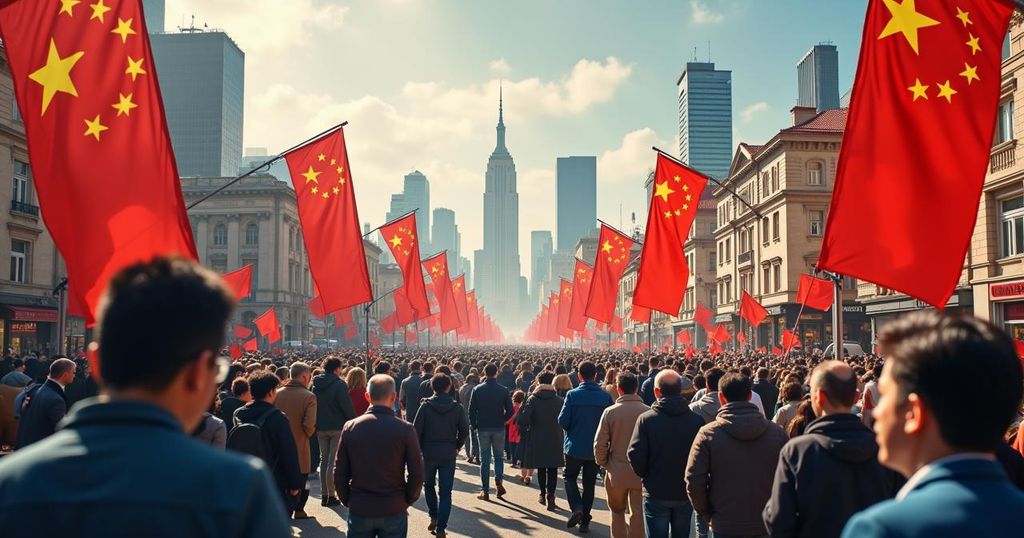Chinese Perspectives on the US Election: Harris or Trump?

Chinese citizens are closely monitoring the US presidential election, expressing concerns about its potential impact on Sino-American relations, particularly regarding Taiwan and trade. Many express a preference for Donald Trump, predicting he may prevent military conflict, while others view Kamala Harris as an unknown factor. The sentiment reflects a desire for peace and improved relations, underscoring the broader implications of American political choices on China.
The interest of the Chinese populace in the upcoming US election is marked by a blend of hope and trepidation, reflecting their concerns regarding its potential ramifications on global and domestic matters. As citizens engage in social activities, such as dance in public parks, they discuss their apprehensions about escalating tensions between the US and China, particularly relating to Taiwan and trade relations. Mr. Xiang, a retiree, articulates a shared sentiment when he states, “None of us wants to see a war.” Similarly, Mr. Meng, an older participant in the conversation, expresses his preference for Donald Trump, perceiving him as less likely to ignite conflict despite his imposition of economic sanctions on China. The desire to avoid warfare extends beyond merely Sino-American relations, encompassing fears about the conflicts in the Middle East and Ukraine. Conversely, many citizens view Kamala Harris as an unknown variable, with concerns that she might continue President Biden’s military support stance, particularly in relation to Ukraine. This complexity in perceptions is further amplified by the lack of familiarity many mothers and fathers express regarding the candidates. Mr. Xiang raises a critical view of economic sanctions, asserting that they ultimately harm ordinary Americans, reflecting a sentiment prevalent among the business community as the country struggles with an economic downturn. Young individuals, while exhibiting a mix of patriotism and admiration for American culture, express a desire for better Sino-American relations, especially through increased exchanges. However, barriers persist, as noted by the sharp decline in American students studying in China, contrasting with the hopes of initiatives that would foster greater understanding among the youth of both nations. Amid these discussions, Lucy, a hopeful student, sees the candidacy of Harris as a step towards gender equality. Her optimism persists despite the political strains, as she dreams of cultural exchange that would bridge gaps between the two countries. Overall, Chinese citizens are acutely aware of the geopolitical complexities and their implications on personal and national security, as they anticipate the outcome of the US election.
The interest among the Chinese populace regarding the US presidential election reflects concerns about its effects on Sino-American relations. With rising tensions over Taiwan, trade, and various global conflicts, many individuals express a strong desire for peace and stability. This current political climate additionally signals a need for Chinese citizens to navigate their thoughts carefully about the US while remaining cautious about voicing opinions about their own government. The economic ramifications of tariffs and sanctions are also a significant concern, as many recognize the associated challenges on both sides of the Pacific. The changes in student exchange rates indicate a declining relationship, emphasizing the need for cultural and diplomatic dialogue to foster understanding between the next generation of both countries.
In conclusion, the upcoming US election garners significant interest from the Chinese public, who are primarily focused on the implications of the potential outcome for peace and stability in Sino-American relations. While some favor Donald Trump’s approach for his perceived reluctance to engage in warfare, uncertainty surrounds Kamala Harris’s policies, creating a sense of apprehension. Amidst a backdrop of economic concerns and cultural admiration, there remains hope for better relations. Ultimately, the desire from the Chinese people for peace, security, and cultural exchange persists as they observe the unfolding political landscape.
Original Source: www.bbc.com








